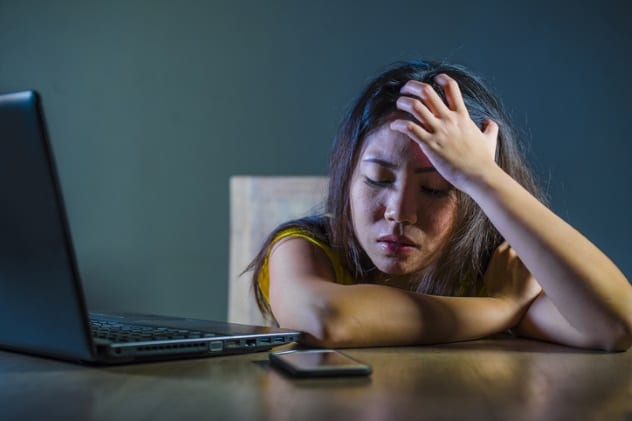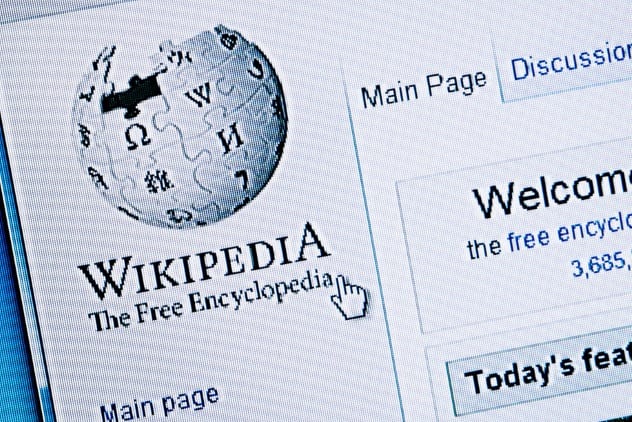 Misconceptions
Misconceptions  Misconceptions
Misconceptions  History
History 10 Amazing Roman Epitaphs
 Weird Stuff
Weird Stuff 10 Niche Subcultures That Are More Popular Than You Might Think
 Mysteries
Mysteries 10 Tragic Disappearances and Deaths in Joshua Tree National Park
 History
History 10 Ways Childhood Really Sucked in the Old West
 Music
Music 10 Name Origins of Famous Bands from the 1990s
 Religion
Religion 10 Biggest Turnarounds by the Catholic Church
 Weird Stuff
Weird Stuff 10 Unbelievable Times Laws Had Unintended Consequences
 Humans
Humans Ten Historic Women Who Deserve Way More Credit Than They Got
 Movies and TV
Movies and TV 10 Films That Spawned Major Lawsuits
 Misconceptions
Misconceptions 10 Phony Myths and Urban Legends That Just Won’t Die
 History
History 10 Amazing Roman Epitaphs
 Weird Stuff
Weird Stuff 10 Niche Subcultures That Are More Popular Than You Might Think
Who's Behind Listverse?

Jamie Frater
Head Editor
Jamie founded Listverse due to an insatiable desire to share fascinating, obscure, and bizarre facts. He has been a guest speaker on numerous national radio and television stations and is a five time published author.
More About Us Mysteries
Mysteries 10 Tragic Disappearances and Deaths in Joshua Tree National Park
 History
History 10 Ways Childhood Really Sucked in the Old West
 Music
Music 10 Name Origins of Famous Bands from the 1990s
 Religion
Religion 10 Biggest Turnarounds by the Catholic Church
 Weird Stuff
Weird Stuff 10 Unbelievable Times Laws Had Unintended Consequences
 Humans
Humans Ten Historic Women Who Deserve Way More Credit Than They Got
 Movies and TV
Movies and TV 10 Films That Spawned Major Lawsuits
10 Legitimate Reasons People Browse The Deep Web
Most media sites love to hate the deep web. They paint it as a shadowy digital underworld awash with nefarious characters that spend their time pedaling drugs, sharing illicit images, and recruiting for terrorist organizations. To an extent, what they say is true; however, there is far more to the deep web than trading firearms for bitcoin.
First, we must distinguish the difference between the deep web and the dark web. The deep web is a collective term for any website that cannot be found via a search engine. These sites might host secure financial records or academic databases. The dark web refers to an encrypted subsection of the deep web that cannot be accessed using traditional web browsers.
Anyone browsing the deep web is free from the constant surveillance of the regular net (in theory, at least). This has attracted a breadth of users keen to have a concealed presence online. Excluding the likes of Silk Road, which has been the subject of more than enough sensationalist articles, these are ten legitimate reasons why someone might browse the deep web.
10 Underground Book Clubs

“Education is liberation,” wrote AdamSmith—not Adam Smith the 18th-century philosopher and economist but AdamSmith the deep web user and staunch critic of censorship. Distribution of digital literature is a hot topic in some corners of the Internet, and guerrilla bibliophiles are far more common than you might expect.
The deep web is a breeding ground for alternative reading material. Online libraries like the Imperial Library of Trantor and Jotunbane’s Book Club are stocked with tens of thousands of specialist volumes and sci-fi novels. Inquisitive readers are able to browse a rich array of tomes on topics as renegade as revolutionary politics, Scientology, and conspiracy theories. There is said to be an especially large collection of titles on Stravinsky.[1]
These libraries also host a number of authors, like Alice Walker and Sherman Alexie, whose works have been forbidden by some schools and institutions. William Gibson’s Neuromancer is another popular read, as is Julian Assange’s Cypherpunks.
9 Digital Advertising

The deep web is something of a gold mine for online advertisers. The underground net tends to attract more technologically savvy and forward-thinking types. Deep web retailers are constantly trying to invent innovative new ways to carry out their business.
For this reason, it has spawned a whole host of cutting-edge advertising techniques. The immensely lucrative native advertising industry. Gmail’s sponsored e-mail ads. The award-winning crowdfunding platform Thunderclap. All of these pioneering ideas started life on the deep web and have since proliferated into the wider world of cyberspace. Creative agencies like Big Spaceship will even employ strategists to scour the deep web and uncover the latest trends.[2]
8 Anonymous Cat Facts

Cat memes will proliferate across any and every corner of the Internet. No nook or cranny is immune from their fatuous pull. In a sense, they are like a digital epidemic, albeit a very cute and fluffy one.
The dark web is no exception. Anonymous Cat Facts is a site that provides exactly what it says on the tin: a seemingly endless supply of feline-related trivia. Simply click the “New Fact” button, and out of the site’s celestial ether will spring another fact about cats.
As always, take everything you read online with a pinch of salt. While Cat Fact #90 innocently points out that cats “sweat only through their paws,” Cat Fact #115 makes the more spurious claim that “87% of cats believe in the prophet Muhammad but do not identify as religious.”[3]
7 Announcing New Music

There aren’t all that many musicians like Richard D. James. Most artists choose to advertise new material via a press release or on regular social media sites. But Richard D. James is not most artists.
In summer 2014, the radical British producer released SYRO, his first new album under the alias Aphex Twin in 13 years. To announce his long-awaited return, James flew a neon-green airship over the city of London. Following this, the Aphex Twin logo appeared scattered across New York.
The eccentric promotional run ended after James shared a link ending in “.onion” on his Twitter account. All “.onion” links can only be opened through Tor, one of the most popular browsers used to access the deep web. Aphex Twin fans who followed the link found that it contained cryptic artwork, along with details of the forthcoming album.[4]SYRO came out just over a month later to enormous acclaim, winning the 2015 Grammy for Best Dance/Electronic Album.
6 Social Media

In this technological age, is there any pie in which Mark Zuckerberg doesn’t have a finger? Over the past 15 years, Facebook has soared from a dorm-run college start-up to a colossal global entity accessed globally by billions of users a month. The highly lucrative brand encompasses messaging, image sharing, and even virtual reality in the form of Oculus Rift.
In October 2014, Facebook took a step into the deep web. Users wanting to access the social media site securely and anonymously can do so through the browser Tor via facebookcorewwwi.onion. The link is highly encrypted for enhanced privacy. Prior to this, anyone connecting to Facebook through Tor was likely to get locked out because the software made it appear as if the account had been hacked.[5]
That said, people should always be cautious when entering personal details online. This advice is particularly true of the deep web, where phishing is a recurring hazard. Websites are created that appear legitimate to deceive users into entering sensitive information, which is then transferred from the phony sites to fraudsters. Scams like this are far more problematic on the deep web, where regulation tends to be a lot looser than the regular net.
5 Evading Cyberstalkers

Thanks to the Internet, it is now simpler than ever to abuse or harass someone. Cyberstalkers are able to listen in to private phone calls, hack bank accounts, and even trace their victim’s physical location from the comfort of a laptop.
Rather than suffer this appalling abuse lying down, victims of cyberstalking are finding refuge in the deep web. Andrew Lewman, one of the co-founders of the Tor Project, has set up a number of countersurveillance programs that were developed in partnership with domestic violence groups.
The incognito web browser gives victims enough time to seek help online without raising the suspicion of their abusers. Victims actually place themselves in the most danger when they start reaching out for help. Stalkers become infuriated when they realize that they are losing control, increasing the risk of violence or homicide. The anonymous avenue that the deep web provides is vital in the battle against cyber abuse.[6]
4 Editing Wikipedia

Creating content for Wikipedia is far more dangerous than some people might imagine. Bassel Khartabil, an editor of the online encyclopedia, is said to have been executed by the Syrian government back in 2015. There are accounts on Twitter that publicly announce whenever an official from the US government makes an edit. In 2017, Turkey decided to block Wikipedia entirely due to disagreements over an article on their investments in terrorist organizations.
In addition, there are a number of controversial articles on the site—such as those on terrorism or drug trafficking—that editors are fearful to contribute to in case their identities are exposed. A significant proportion have stopped writing for the site altogether, concerned about the damaging effect it could have on their professional reputations.
To protect both users and contributors, experts are experimenting with the idea of a dark web Wikipedia. In 2017, developer Alec Muffett created a temporary version of the site that was only accessible through Tor. It is thought that hosting the encyclopedia on the anonymous network will make it more accessible to people living under media censorship while also addressing the issues of editor security.[7]
3 Political Dissidents

People have never shied away from using the deep web as a political tool. In fact, the US government partially funded the development of the Tor browser to provide open access to the Internet internationally (although, seeing how the dark web has become a breeding ground for arms smuggling, criminal activity, and the likes of Julian Assange, it could be argued that the project has backfired).
During times of political turmoil, the deep web can become essential for resisting online censorship and state repression. In the Egyptian revolution of 2011, rebel forces took to communicating over Tor after President Hosni Mubarak attempted to instigate a social media blackout. The anonymous network played a vital role in the uprising, allowing protesters to organize action and to expose the abuses of Mubarak’s regime to the wider world.
After Mubarak was ousted, the Free Software Foundation presented Tor with the Award for Projects of Social Benefit. The foundation praised the fact that the network “intentionally and significantly benefits society.”[8]
2 Exposing Abusers

The supposedly “secret” dark web is nowhere near as secret as many of its users might like to believe. Hackers and technology experts are, piece by piece, cracking down on the despicable characters that lurk in the depths of the dark web. Websites that share abusive content are being hunted down and blocked at a rapidly accelerating rate. An increasing number of dark web felons are incarcerated for their crimes.
Typically, to expose the hosts of an abusive website, hackers will try to locate the IP address of their server. An IP address is a unique string of numbers through which any device connected to the Internet can be identified. On the regular net, an IP address is easy to pinpoint, but dark web users deploy various techniques to ensure that their address remains concealed. The challenge is to find and exploit the weak spots in these techniques, essentially to break in through the chinks in their armor.
Hackers have been successful in shutting down a number of high-profile sites in recent years. In 2015, IT security experts unmasked 95,000 people from across the world who had downloaded videos and images of child abuse. Two years later, a team of hackers from Norway made headlines after uncovering that the child abuse forum Childs Play was, in fact, run by operatives from the Australian police.[9]
1 Journalists And Whistle-Blowers

Freedom of speech has become an extremely contentious issue for anyone publishing online. Websites and journalists reporting on sensitive or controversial topics are faced with threats of serious repercussions. Attacks on net neutrality have handed service providers the capacity to block any news outlets that might disagree with their analysis or impact their shareholders. In 2018, Washington Post writer Jamal Khashoggi, a fierce opponent of the Saudi government, was tortured to death for his outspoken views.
For journalists who strive to disseminate the truth, particularly those reporting on corruption in governments and businesses, the dark web is able to provide protection and anonymity. Writers are free to publish otherwise restricted information without the fear of making themselves conspicuous. It is hoped that on the dark web, journalism can be judged on content and merit alone, rather than who appeases the powers that be.
The question is this: How reliable is information that has been passed along the dark web? Nameless sources can be incredibly difficult to validate. Do we trust anonymous journalists to report honestly?[10]
Writer from Britain.
Read more about the less conventional side of the Internet on 10 Stories Of China’s Human Flesh Search Engines and 10 Attempts At Internet Vigilantism That Made Things Worse.








